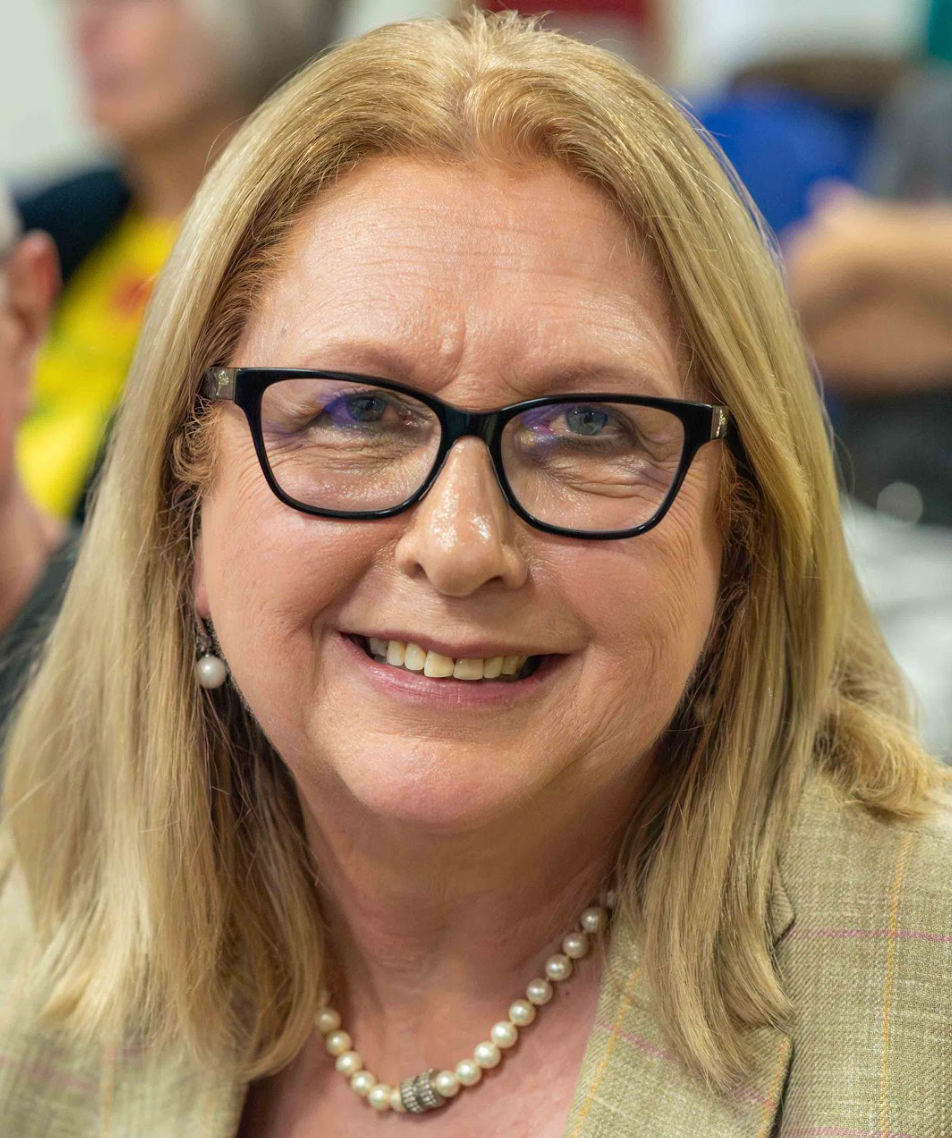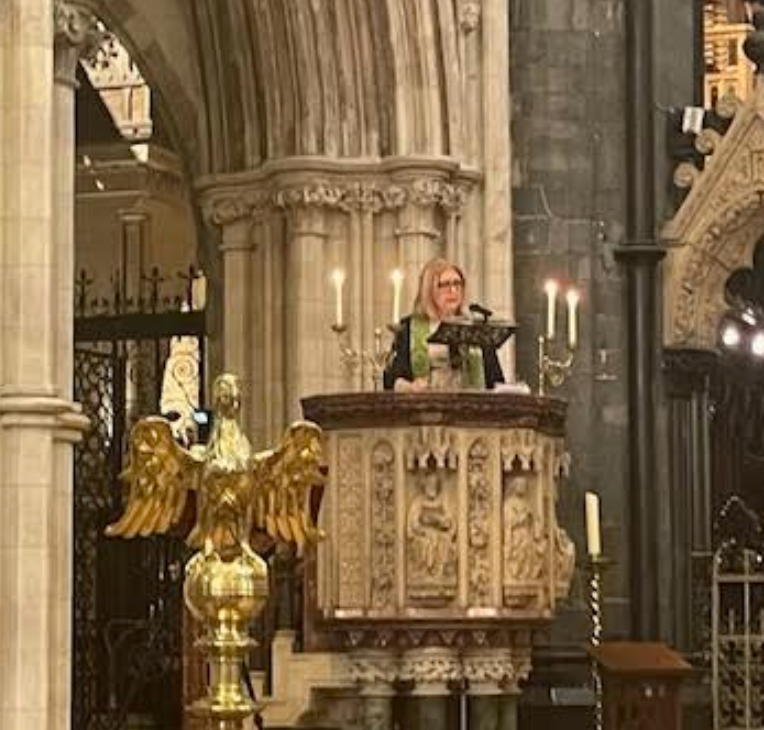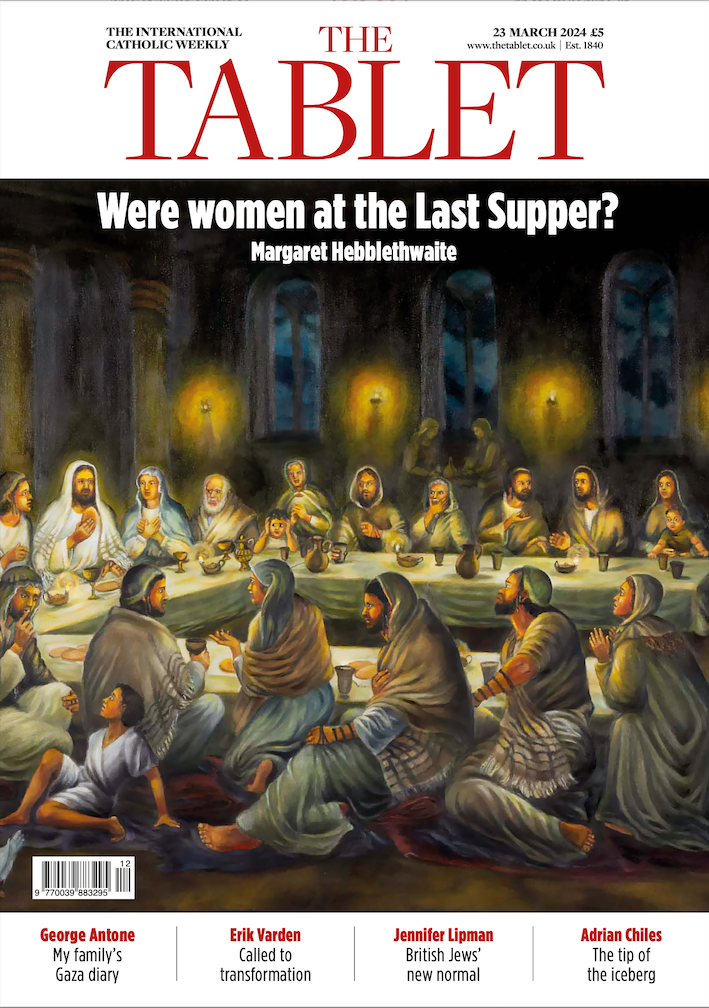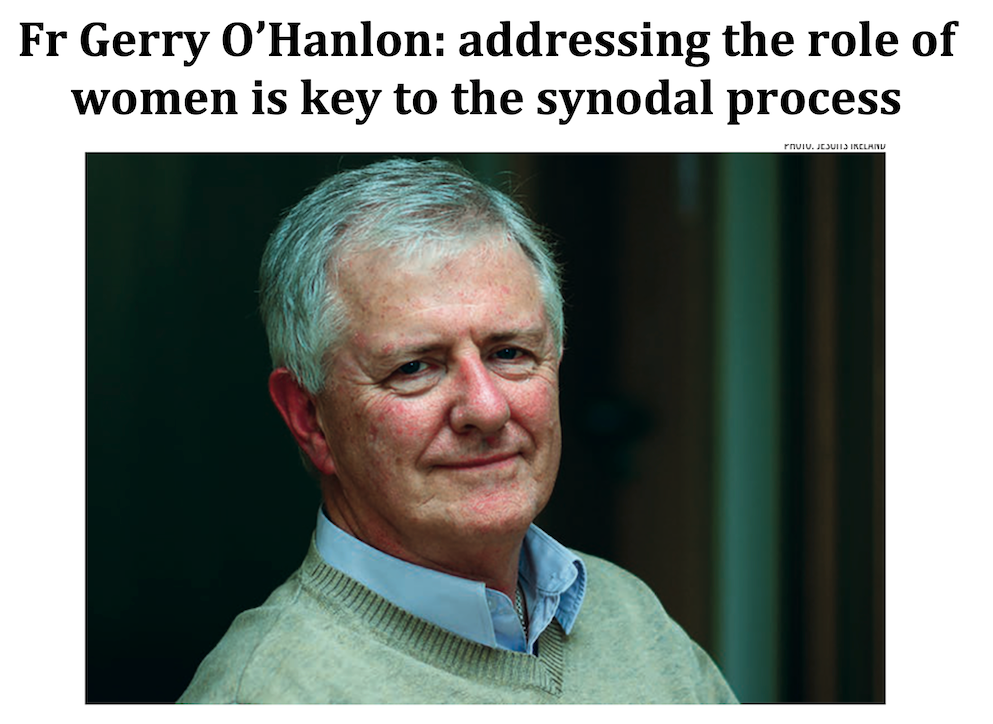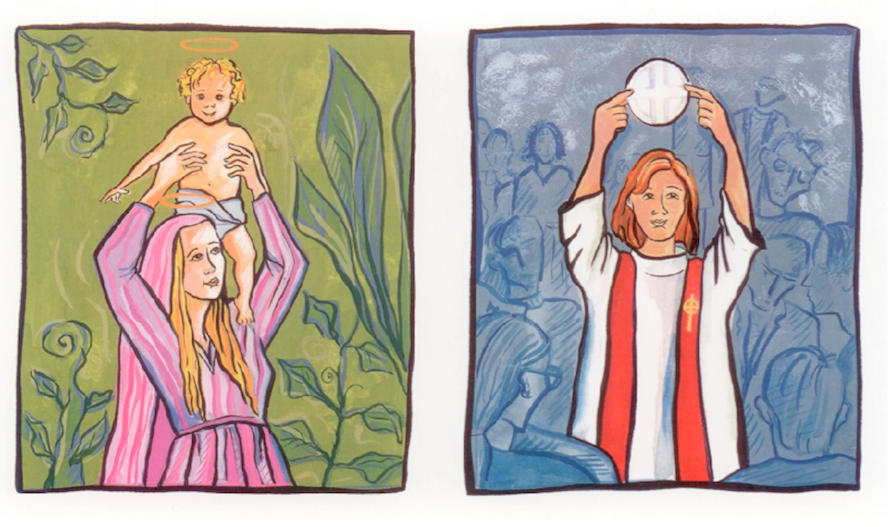WAC International Contribution to Synodal Process
Preparing the 2023 synod of bishops

WAC contribution to the synodal process
Preparing the 2023 synod of bishops
Introduction[1]
The We Are Church International (WAC) offers its contribution to Synod 2021-2023 "For a Synodal Church : Communion, Participation, and Mission " in light of the Preparatory Document and, in particular, the " Ten Thematic Nuclei to be Explored ".
To-day, in our Catholic Church, the "journeying together", that
« enacts and manifests the
nature of the Church as the pilgrim and missionary People of God » (PD 1) and “allows the Church to proclaim the Gospel” (PD 2), is realized in a very weak and defective way because :
a) the hierarchical dimension and the concentration of power in the ordained ministers generate a systemic separation between them and the laity who are merely executors,
b) there are few examples of synodality since the councils that do exist (pastoral, presbyteral, etc.) are then merely consultative, and
c) the few successful achievements of synodality are linked to the personality, ideas and availability of open-minded ordained ministers. But they are subject to his will and often disappear when he moves on.
All this generated a “culture imbued with clericalism … and with those forms of exercising authority on which the different types of abuse (power, economic, conscience, sexual) are grafted. " (PD 6). To remedy this, the Church must convert to synodality and have faith/trust in the Spirit who always leads his Church.
To grow in synodality, the Church must respond to the Spirit's invitation to become a more community-based Church of brothers and sisters, equal in their life as disciple, an "inclusive" Church capable of "recognizing and appreciating the richness and variety of gifts and charisms" of its members, including the least of these, a Church that credits them with their good faith and must become accustomed to living in the pluralism of ideas (PD 9). This requires in particular:
a) opening of all ministries to those who are currently excluded (women, married men, LGBTQ+ persons, etc.) according to their competence and charisma,
b) relationship of equality between all members of the Church whatever their responsibility are since they are sisters and brothers. This means in the present situation relationship of equality between laity and clergy, even at the level of decision-making,
c) revision of governance, including the separation of powers,
d) establishment of small ecclesial communities (promoted by Vatican II, see also EG 29)
e) the abolition of all kinds of sanctifications/ ordinations, only assignments/commissions, gladly in solemn form
All this would be in keeping with the Gospel and the situation in the early Church and at the same time it would be the decisive way out of the current Church crisis, to promote a discipleship of equal brothers and sisters taking on different responsibilities for the community in different ministries/services.
This involves promoting:
a) training in synodality,
b) the creation of synodical structures, including the creation of particular synods to settle disputes, especially when the “depositum fidei” is at stake, whose existence is not left to the will and sensibility of the clergy and whose functioning expresses co-responsibility and not a simple consultative character;
c) the definition of procedures to prevent the sensus fidei fidelium from being left to the good will or sensitivity of priests and bishops; this implies the establishment of academic freedom for Catholic theological researchers;
d) the establishment of new structures (national and continental ecclesial assemblies, patriarchates or continental episcopal conferences, ;etc.);
e) the establishment of structural forms of consultation, exchange and comparison with other Christian Churches;
f) the creation of a new legal system with separation of powers, participation in decision-making and independent control of power.
Hence the 24 proposals expressed within the “Ten Thematic Nuclei” proposed by the Vatican
I. THE JOURNEYING COMPANIONS
The journey that our Church undertakes, leaving the comfort of the present situation to go towards an "unknown" future, in order to transform itself into a synodical Church, can seem dangerous, as it was for the people of the Hebrews at the call of Moses: we should expect recriminations, like those of the Hebrews at the time of the crossing of the Red Sea (Ex. 14, 11-12).
This journey, the "common march" of the People of God "with the whole human family" (PD 29), requires overcoming the tendency of the Catholic Church and Catholics to act in the world separately from others, not to mix with other Christian Churches or other social actors. It implies profound reforms, expressed in the 24 proposals presented below, in order to improve the capacity of the Church to accomplish, with the participation of all its members in communion, its missions, namely the proclamation of the Gospel, and the reformulation of the message for a 21st century world.
This implies in particular:
a) reorganizing the Church to adapt it to its mission and to what it is,
b) modifying its governance (separation of powers, clerical and lay co-responsibility) by introducing a synodical functioning,
c) rethinking the meaning and organization of the services (ministries) it needs (desacralization, access to men and women...).
But this journey is necessary so that the Church does not risk being reduced to a sect, and can accomplish its missions in communion. According to Matthew, Jesus said: " Neither is new wine put into old wineskins. If it is, the skins burst and the wine is spilled and the skins are destroyed. But new wine is put into fresh wineskins, and so both are preserved.” (Matthew 9:17),
Do not be afraid because we will be accompanied by the blow of the Spirit, as Jesus promised us « “If anyone loves me, they will keep my word, and my Father will love them, and we will come to them and make our home with them… the Helper, the Holy Spirit, whom the Father will send in my name, she will teach you all things and bring to your remembrance all that I have said to you.” (Jn 14, 23 et 26)
Pr1: All baptized, men and women, and not only those who practice in the parishes, constitute the Church and are therefore the journeying companions. Members of other faiths are also journeying companions. All of good will are welcome on this journey
For this reason, since its inception in 1996, WAC has worked with other movements for the reform of the Catholic Church, beginning with those that represent people and groups usually left on the margins of the Church (women, remarried divorcees, married priests, LGBTQ+ persons, etc.), but also with ecclesial forms that prefigure a more inclusive and participatory way of being Church (grassroots ecclesial communities, etc). On many occasions, WAC has also worked alongside popular movements and grassroots organizations committed to peace, social justice and the integrity of creation.
II. LISTENING
Each disciple is a dwelling place of Jesus and receives the Spirit (Jn 14:23-26). Therefore, all disciples must be listened to in order to give each of them the opportunity to share what they have perceived of the Gospel. Without doubt, "listening is the first step", but to be authentic, it implies recognizing that the other has something to say that may concern me, and inviting them to participate in the decisions that result from the dialogue. Otherwise, the simple act of listening risks becoming a means of reaffirming one's own superiority and the inferiority of others, even their exclusion.
There are many people towards whom the ecclesiastical institution has a "debt of listening": the laity, but especially lay women, young people, workers, sexual minorities, etc.
Pr2: A synodical church must organize itself in such a way that all its members can be heard and listened to.
III. SPEAKING OUT
In the logic of the above, each disciple should not be afraid to share what he or she perceives of Jesus' message and the way it is presented and lived within the Church. Is this not what Jesus implies in the Parable of the Talents (Matthew 25:14–30)?
But in order to "promote a free and authentic style of communication within the community and its bodies", it is first necessary to recognize a true freedom of expression, which is unthinkable as long as the expression of opinions against the majority or the official word leads to disciplinary sanctions or de facto censorship.
However, the word is currently monopolized by clerics and often even by bishops. This situation gives the false image of a Church made up of clerics only.
Pr3: It is therefore essential that, all members, i.e.in the present situation the laity included, be able to speak in the various organs of the Church, in celebrations and in the external media, in a spirit of sharing and attentive listening to each other, without condemnation.
Pr4: To this end, formation for all members, i.e. in the present situation for clergy and laity, should be organized to enable them to acquire the attitudes and skills necessary for the practice of truthful dialogue in mutual respect, as well as the skills for non-destructive conflict management.
Pr5: Pluralism of ideas must be fully legitimized so as not to encourage conformism.
IV. CELEBRATING
IV.1 Sacraments and the Meaning of the Mass
When we celebrate the sacraments and especially the Eucharist at Mass, their liturgy is often "separated" from life, because it is considered a "sacred space and act" in which a ritual is performed that is no longer capable of speaking to men and women today.
Pr6: Rethinking celebrations and their liturgy so that they
- express in a comprehensible symbolic form their link with the Gospel, faith and life, integrating the existential experience of the people, the journey of the community and the socio-cultural context in which it evolves.
- ensure that this encounter of each disciple with Jesus Christ and with his or her brothers and sisters in the course of the celebrations will increase and nourish his or her desire, strength and capacity to respond to the calls of Jesus, to live a life more coherent with the Gospel and to witness to it more effectively.
Pr7: Rethink the meaning and place of the sacredness in celebrations and especially in the Mass,
Jesus having revealed to us that there is no longer any need to make sacrifices because every human being has a direct relationship with God. And Jesus died for living love to the extreme consequences.
Thus, the Eucharist is the thanksgiving meal to which Jesus invites a community in order to nourish its members with his word and his being under the species of bread and wine shared in memory of what he is, of his life given, of his death and his resurrection. Jesus is thus present at this Eucharistic meal:
1) within the community itself, gathered in his name: " For where two or three gather in my name, there am I with them”. (Mat 18:20),
2) in each of its members: " Anyone who loves me will obey my teaching. My Father will love them, and we will come to them and make our home with them” (Jn 14:23),
3) through his word "for he speaks as the Holy Scriptures are read in the Church" (Sacrosanctum Concilium 7),
4) by the bread and wine thus shared in memory of him
Consequently, in order to preside over the Eucharist, there is no need for celibate males to be placed above the other disciples to act "in persona Christi" and having the "power" to "make Jesus present", for he himself tells us: " For where two or three gather in my name, there am I with them " (Mat 18:20). It is the people of the baptized, organized in communities, who celebrate under the moderation of one of its members, within the framework of a Church made up of ecclesial communities, living cells of a synodical Church.
The current model of priest generates a two-class Church, which Jesus never proposed and which contradicts what Paul said to the Galatians: " There is neither Jew nor Gentile, neither slave nor free, nor is there male and female, for you are all one in Christ Jesus" (Gal 3:28). Moreover, this model leads the current ecclesiastical institution to organize communities around fewer and fewer priests, instead of allowing local communities to celebrate, generating "deserts of communities”.
Pr8: Explain the meaning of the Eucharist and the impacts on its liturgy in view of the latest results of theological, historical and exegetic research.
Pr9: Rethink the theology of ministries, the status of ministers, the state of a priest, the notion of "priesthood", desacralizing it, ridding it of the notion of "representative of God and Christ on earth", and opening it to women as well as to men. Develop a new system of services for the community
Pr10: Consider the priesthood as "service of the evangelical word and of community life". See it as a task to animate, in co-responsibility with the laity, the services devolved to every community, the evangelical witness, prayer, community meditation of the Bible. This involves the celebration of the sacraments and especially Eucharistic sharing, the service of communion within the community and of this community with other communities. It includes also formation, teaching and transmission of the faith, responsibility for the material life of the community.
IV.2 The Need for small (grassroots) Ecclesial Communities
Small (grassroots) ecclesial communities carry out the missions of the Church by working, together with their brothers and sisters in humanity, for justice and peace so that it can be said: "There are no poor among them" (Acts 2 and 3) and "See how they love one another". These small communities are made up of a limited number of members living a koinonia (communion), which allows for celebrations, personal deepening, evangelization, prayer, fraternity and active and fraternal presence in the world in a flexible and decentralized organization.
Pr11: In order to celebrate and vivify the celebrations and the ecclesial life, it is necessary to set up small (grassroots) ecclesial communities close to the inhabitants of a neighborhood, or to the members of a movement, or of an association, or of a social and professional environment. These basic ecclesial communities must be connected to each other, in order (1) to be in communion with the universal Church and (2) to be challenged in such a way that they do not shape a Jesus to their own liking.
Thus, the small (grassroots) communities grouped together at the level of a parish constitute the parish community, the parish communities grouped together constitute the diocesan Community, the diocesan communities constitute the national Community, and all the national Communities constitute the universal Church.
The Church is thus both close to the places where men and women live, which allows it to present the Gospel message in the culture understood by these men and women, and universal, which allows it to build a unity in the diversity of approaches and languages, much more in keeping with the spirit of the Gospel than unity in uniformity (cf. Babel’s Tower).
V. CO-RESPONSIBLE IN THE MISSION
To proclaim the Gospel and to witness to it today, by what it says, lives and does, requires our Church
I) to present the Good News of Jesus in a language and culture adapted to the socio-cultural context of the various parts of the world of the 21st century, taking into account the evolution of the understanding of the world and of human relationships due to scientific progress, and of the Bible as a result of research in history, theology and exegesis. This implies, in particular, an appropriate revision of everything that no longer makes sense today. Thus
Pr12: Research in theology, exegetics and history of religions must be academically free in all research institutions and universities, including those managed by the Church
II) To accompany and support its members, as well as the men and women of the world today, in their life and their path for deepening their humanity. The organization of the Church into ecclesial communities greatly facilitates this accompaniment
Small (grassroots) Ecclesial communities facilitate the establishment of co-responsibility in this double mission of the Church by allowing all their members to contribute according to their charisms, competencies and availability. Indeed, the functioning of the communities at all levels of organization of the Church and the assignment of responsibilities and ministries necessary for their functioning at each of its levels of organization are based on equality between men and women, and exercised within the framework of synodical structures to allow all their members to participate actively in its life without exclusion.
Pr13: Persons engaged in ministries must have the training, skills, and charisms required to perform them. They must be nominated from among the members of the community that they will serve, or be called by that community. They must be recognized (or empowered) by the Church as a whole in order to be a sign of universal communion and to be able to ensure the necessary links between communities, since each community is only a cell of the Church.
Pr14: Any person, man or woman, who is to exercise a function within a community will be "called" by a vote of the members of that community according to a synodical process that the Church will have to set-up by appealing to the sensus fidelium.
For example:
the person presiding at the celebration of the Eucharist (a priest at present) within a community will be proposed by that community by election and will have to be "recognized" or empowered at least by the diocesan community on which it depends;
the person in charge of the communion of the diocesan community (currently the bishop) will have to be proposed by election by the diocesan community concerned and recognized by the national community and the whole of the international Church through an international synodical body.
Pr15: In order to accomplish its missions in co-responsibility, our Church must equip itself at each of its levels of responsibility (e.g., local, parish, diocesan, etc.) with synodical bodies composed of representatives of the different components of the people of God and charged with discerning and making the decisions necessary for the life of the Church at that level (local, parish, diocesan synods, etc.), and for its mission.
VI. DIALOGUE IN CHURCH AND SOCIETY
There is currently little room for dialogue in the Church, both
- because the clergy are still assigned, at least implicitly, the functions of teaching, decision making and animation, with the result that communication is one-way,
- and because the imbalance of power in decision-making processes sometimes makes listening sterile.
The same is true of the participatory bodies, which are confined to a consultative role. Thus, the suggestions of the laity can sometimes be expressed, but they are not taken into account; divergences and conflicts are sometimes dealt with by seeking syntheses, but most of the time they are ignored or even repressed in law and in fact.
But when does the sensus fidei manifest itself and become binding? What happens when the sensus fidei and the magisterial function of pastors come into conflict (for example, in the prohibition of the use of artificial contraceptives)?
In fact, the hierarchy generally thinks that they have all the answers, so that they almost never dialogue, at least explicitly, with other ideal positions with a view to modifying their own, but rather tends to emphasize, sometimes even beyond reality, its autonomy from the demands of the world (see the insistence that "the Church is not a democracy", referred to in a certain way in PD 14, but in fact the Church is much more than a democracy).
However, in the relationship with society, it is necessary that the commitment to peace, justice and the integrity of creation be a "Church commitment" and not an accessory and optional activity of the Catholic beings. It must therefore be an integral part of the formation of clergy and laity.
Pr16: The Church must establish the necessary structures for dialogue at all levels of its organization, both for internal issues and for those concerning society, and the corresponding training for laity and clergy.
VII. WITH THE OTHER CHRISTIAN DENOMINATIONS
Relations with other Christian denominations are generally non-confrontational and sometimes cordial, but there are currently relatively few examples of collaboration. "Doing together everything we don't have to do separately" is a slogan far from reality.
. More decisive steps are needed both in common service to the world and in mutual acceptance:
Pr17: The Church must open discussion with other denominations (faiths) in order to create and develop appropriate structures for relations with other denominations (faiths) such as ecumenical councils of churches, ecumenical bodies (or others), to improve the reception of ecumenical dialogues and to develop Eucharistic hospitality.
VIII. AUTHORITY AND PARTICIPATION
It is necessary to open all ecclesial ministries to all disciples. The present weakness of the organs of synodality stems from their inadequate organization, procedures, etc., which can already be improved, and from the discrepancy between their conclusions and the decisions taken by the clergy in an entirely autonomous manner.
In the present situation, all powers coincide in the hands of one cleric, at the different levels of organization of the Church. This leads to dramatic scandals, as it was experienced in the sexual abuse crimes of clerics. Such a systemic dysfunction must first be recognised. In this respect, as a first step, the confession of personal guilt and personal acceptance of their responsibility by church officials is of great importance (even though they may have acted correctly according to the letter of Church law), particularly for the survivors of sexual and spiritual violence who must be acknowledged.
Therefore, it is proposed:
Pr18: No longer do all powers coincide in the hands of one person. The exercise of authority in the Church requires a distinction between legislative, executive and judicial powers.
Pr19: Ecclesiastical tribunals should be composed of competent clerics and laity and have the right to prosecute ex officio crimes of which they have knowledge without being subject to episcopal authorization and respecting the principles of "giusto processo" (knowledge of the accusation, right to adversarial proceedings, impartiality of the judge, etc.).
Pr20: As an example, it is proposed that the legislative power be the responsibility of a synod composed of clerics and laity elected according to a process to be defined, and the executive power be that of the bishop within an appropriate synod.
IX. DISCERNING AND DECIDING
Pr21: It is essential that the whole Church (all baptized men and women) participate in the elaboration and decision making concerning them..
This includes discernment, which involves listening and debate. Therefore:
Pr22 (cf. Pr16 Pr15): Provide the Church, at each of its levels of responsibility (e.g., local, parish, diocesan, etc.), with its own synodical bodies, including structures for appeal in case of strong opposition to certain decisions. These bodies should allow for dialogue, consultation and decision-making with the input of the members of the community who can thus express their sensus fidelium and contribute to the life of their community.
For a given level, members of the Church (including the ministers concerned) of that level must be part of these synodical bodies that have competence for the questions pertaining to that level (principle of subsidiarity).
X. FORMING OURSELVES IN SYNODALITY
Training in synodality implies, especially for the members of our Church, being open to the richness of the synodical organization, of the transition that it implies from the "current theology of the priesthood" to that of service within (and not above) the people that implies clerics and laity co-responsible for the organization, the government, the mission and the functioning of the Church, according to their charismas and their competences. This implies a new look at what is sacred.
Pr23: This training to synodality must therefore combine practice and reflection. To do this, it is necessary
1) to practice synodality from now on, starting from what is currently possible. At this end, opportunities for action that are already canonically possible must be immediately addressed in the individual dioceses and implemented in "immediate programmes".
2) to build step by step the elements proposed above from this experience.
Pr24: It is also necessary to train clerics and laity to work and make decisions in teams. For those who will be entrusted with a function of authority, to be trained to exercise it as a service to the people "infallible in credendo", in co-responsibility.
This document was prepared by François Becker (France) and Mauro Castagnaro (Italy) for WAC International.
The Coordinating Team of WAC International approved publication of this document on 23.February 2022.
[1] In this document:
- PD stands for Preparatory Document Synod of Bishops 2023
https://www.synod.va/en/documents/english-version-of-the-preparatory-document.html
- EG for Apostolic Exhortation Evangelii Gaudium on the proclamation of the Gospel in today’s world






